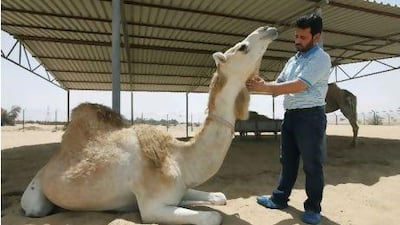DUBAI // For centuries, people in the region have relied on camels for transport, dairy products and food.
But in the not-too-distant future, the ship of the desert may also provide human medicines.
Scientists in Dubai say they have taken an important step towards creating a genetically modified camel that produces medicinal protein in its milk, which could help to treat thousands of genetic diseases as well as diabetes, obesity and emphysema.
The Camel Reproduction Centre has produced cells carrying artificially introduced genes similar to those of humans. That takes them closer to creating a camel that can provide products such as human insulin in its milk.
The lab is using cells modified with strands of DNA from different species, but once it manages to insert these into camels, the next step will be to use human genes.
"Camels are unique animals and they are very good for producing pharmaceutical proteins," said Dr Nisar Wani, the head of the centre's reproductive biology lab.
It would, Dr Wani said, be easy to tell with a microscope whether inserting the genes had worked, "so we don't have to wait for the animal to start producing milk".
The lab is also trying to use genes from other species to improve camels in areas such as increasing pace or giving more milk.
This could be useful for pharmaceuticals. If a camel that produces insulin in makes more milk, it means more insulin from fewer animals.
"If we use good milking camels with transgenic camels that secrete the pharmaceutical protein in their milk, we can harvest those proteins and use them in the pharmaceutical industry," said Dr Wani.
"We have the transgenic cells now. They're frozen, so we can start using them."
The protein can be extracted from camel blood or milk and then purified and sold. And although an end product could still be five years off, if successful it promises to be a cheaper source of vital drugs.
"Patients with genetic disorders need these proteins, which are very costly today because companies are producing them by bacterial cultures in their labs," Dr Wani said.
"But if we're successful at producing them in the milk, say in 15 to 30 litres, we can get a huge quantity of protein and that will drastically decrease their cost worldwide."
Eventually, the technology could also be used to grow organs for transplanting into humans.
"Soon we will have organs that will be like universal tools for anybody who has a kidney failure or heart problems. He can get the organ from the animal," said Dr Wani.
Progress has recently been slow, as the lab is short of staff and has spent much of the past year working on cloning other animals.
But there have been successes. In 2009, the lab successfully produced its first cloned camel, named Injaz. The following year, Saudi researchers managed to sequence the camel genome.
Persistence is key as camels are "unique animals" for such work. They are highly resistant to disease and adaptable to different climates.
"They have a more efficient food-conversion ratio and they are easier to maintain compared to cows, especially in this environment," Dr Wani said.
One of the current challenges is getting fertilised transgenic embryos to "take" in camels' wombs. It is a tricky process because the embryo is created from a somatic cell - a normal body cell, rather than an egg. Only a very few attempts are successful, so they need a ready source of embryos.
"We are now trying to produce more babies," Dr Wani said. "We produce hundreds of embryos, we transfer them into the recipients and if we are lucky, we can get up to five pregnancies.
"From those, maybe only one or two will reach the delivery stage."

